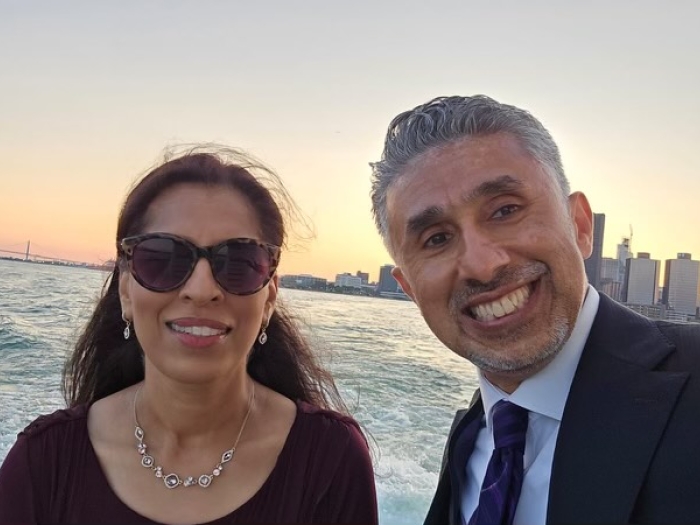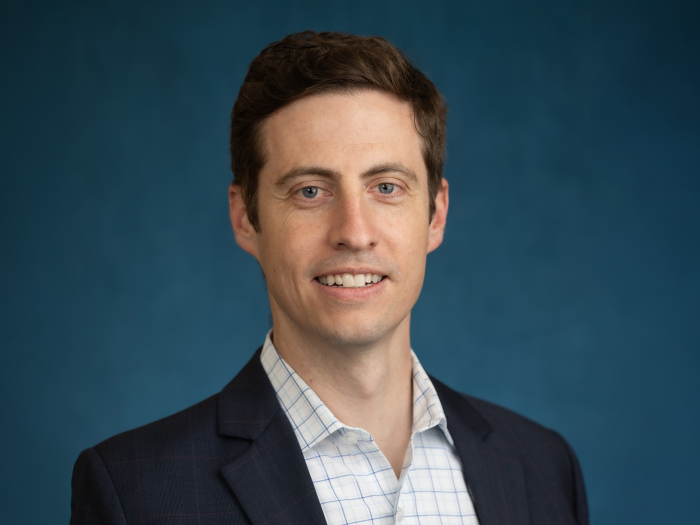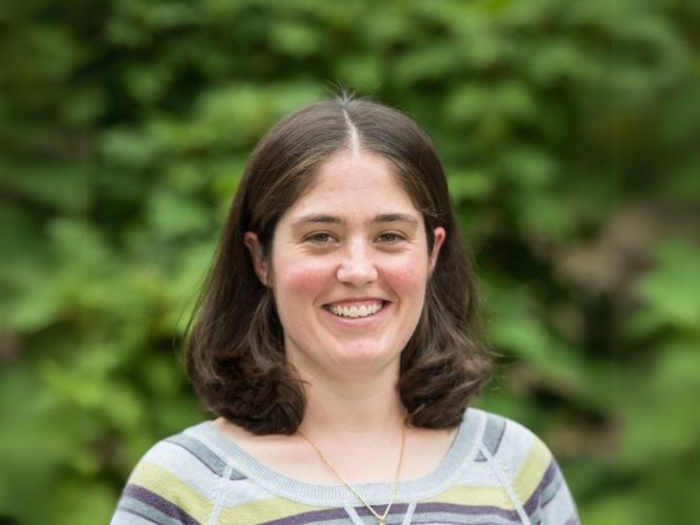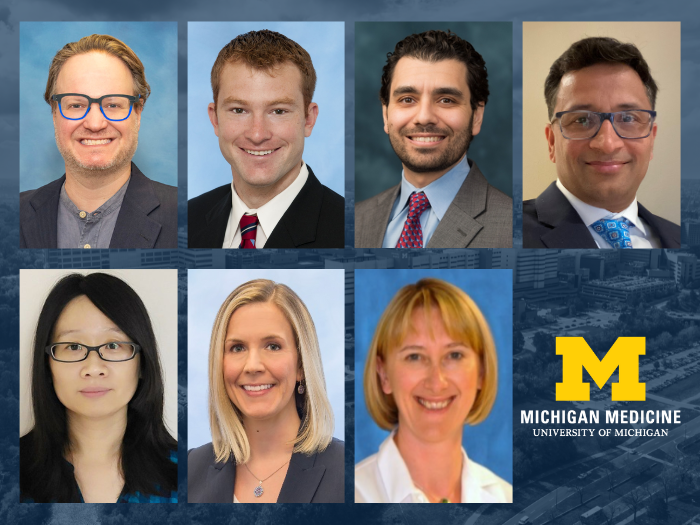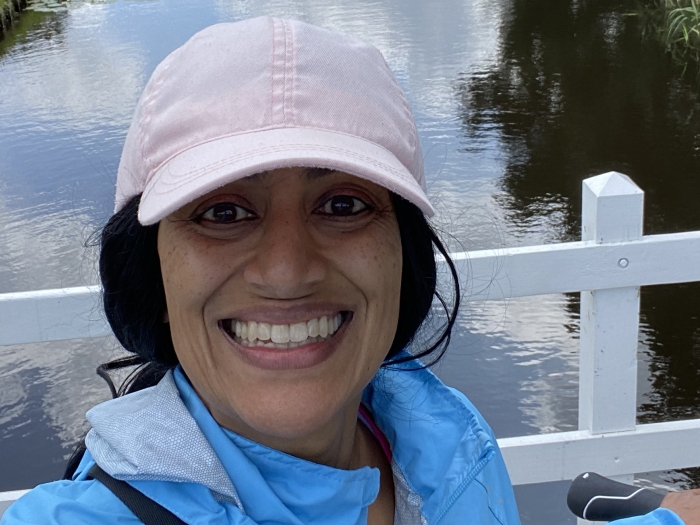
Dr. Blaszczak's Michigan Answer: I looked from the west coast to the east coast for both medical school and residency, and I just couldn’t find somewhere better for me to grow and thrive as a future physician. I found a supportive, collaborative community here.
Julie Blaszczak (she/her/hers), MD, MEHP, is Assistant Professor in the University of Michigan Department of Family Medicine. After completing an undergraduate degree at U-M, she pursued a robust curriculum of medical school programs, trainings and academic fellowships. During her family medicine clerkship, she spent time at the Michigan Medicine Ypsilanti Health Center and discovered her calling there. Dr. Blaszczak earned a Master of Health Professions at Johns Hopkins University, where her training allowed her to become an effective educator in a multitude of spaces. She has held a number of positions at several institutes, including the Department of Family Medicine Faculty Development Institute and the Michigan Academy of Family Physicians Student and Resident Education Committee. She also serves on the Advisory Committee on the Advancement of LGBTQIA+ Health at Michigan Medicine.
Interested in social justice work and addressing health disparities, Dr. Blaszczak followed her passions for family medicine and discovered that Michigan provided the resources and opportunities she needed in order to explore any interest. While at Michigan Medicine, she has found the culture to be one of collaboration and well-roundedness. She encourages students to find a place that will foster joy and happiness, both inside and outside of the classroom and clinic.
What appealed to you about coming to the University of Michigan Medical School/Michigan Medicine for a faculty appointment?
I am a “U-M lifer” – I completed my undergraduate degree (in anthropology), medical school education, family medicine residency training, and academic fellowship training at U-M. I think some may view this as complacency and simply standing still, but I tell people all of the time that I looked from the west coast to the east coast for both medical school and residency, and I just couldn’t find somewhere better for me to grow and thrive as a future physician. I also never wanted to run away, because I found a supportive, collaborative community here. One of the most important aspects of Michigan Medicine that drew me to stay is what feels like the infinite resources and opportunities available to explore any interest. Whether it is within education, leadership, clinical care or research, you will find the community you need here.
What drew you to a career in your specialty and what advice do you have for medical students when it comes to selecting a specialty?
I was the first person in my family to go into medicine, and I didn’t even know what family medicine was before I started medical school. When I spent time at the Michigan Medicine Ypsilanti Health Center during my family medicine clerkship, where I was later lucky enough to do my residency training, I quickly found my community and calling. The physicians were some of the most compassionate, brilliant people I had met, and they truly cared about what happened to their patients outside of the clinic room as much as they did inside the clinic room. I recognized that my path was leading toward family medicine, as I was always interested in social justice work and addressing health disparities, and family medicine physicians are well positioned within their communities to work with patients to address outcomes. I also realized that I was the typical family medicine person who loved many parts of medicine, and I am fortunate to still be able to do prenatal, inpatient, outpatient and procedural care as part of my practice.
There are pros and cons to every single specialty in medicine, so I encourage students to find the specialty that brings them the most joy. What do you envision yourself getting up early in the morning to go do and feeling excited about? There will always be hard moments but find the specialty that makes those moments worth the challenge. Make sure to find out what the real day-to-day life is like for each kind of specialty and do your best not to base your future on one physician or one day on clerkships. Happy physicians make good physicians!
We encourage our medical students to pursue their passions while in medical school -- what do you see as your professional passions, how are you able to pursue those while working at Michigan Medicine, and why is that important to you?
I have a particular passion for medical education and teaching, and with the support of my department, I was able to pursue a Master of Health Professions from Johns Hopkins University during my Academic Fellowship. This program provided me the formal training in curriculum development, assessment, mentorship and many other aspects of medical education that has allowed me to be a more intentional, thoughtful educator. I work as an educator in many spaces, including in my clinic as well as through the Doctoring program, and I find that I am more effective as an educator and more open to learning how to be a better educator because of the training I was able to pursue. It has also afforded me the opportunity to be a leader in educational spaces, including as faculty lead of the University of Michigan Department of Family Medicine Faculty Development Institute 1.0 and former chair of the Michigan Academy of Family Physicians Student and Resident Education Committee.
Another passion of mine is LGBTQIA+ health, more specifically gender-affirming care in the primary care space. It is well known that provider lack of knowledge is a significant barrier to care for this community. I have been able to create my own gender-affirming hormone initiation clinic in order to support educational opportunities for residents and students, and I was part of a team that created a transgender clinic at the Corner Health Center. With a group of multidisciplinary content experts, I developed a self-directed, online curriculum for family medicine residents on gender-affirming care, and I was able to advise students in the creation of a two-week online elective on LGBTQIA+ health. I also serve on the Advisory Committee on the Advancement of LGBTQIA+ Health at Michigan Medicine, which includes faculty, staff, learners and patient volunteers.
Finally, as a clinician, I have been able to maintain the breadth of my practice I always wanted (inpatient, outpatient, prenatal and procedures), which is not always the case in all departments or academic centers.
What do you see as your overall purpose/mission when it comes to shaping future physician leaders (reference any related roles you serve in)?
When I was a medical student in what was formally called the Family Centered Experience and Clinical Foundations of Medicine, which have now merged to be called Doctoring small groups, I dreamed that I would one day be one of the faculty leading those groups. Those faculty shaped my medical school journey and provided consistent support, and I wanted to do the same for future students. I am lucky enough to now be a Doctoring faculty, and I see my role as someone who creates inclusive spaces for students to be brave and fosters an environment of joy and support as students move through their medical school career.
I also have a specific mission to have as many students and residents as possible graduate from our programs feeling comfortable providing gender-affirming care. I anticipate that addressing this gap in education will have profound effects on patient care and access to high-quality, compassionate care.
I am also a member of the UMMS Admissions Executive Committee, and it has been one of the greatest experiences of my career to be a member of the group. It is a group of the most thoughtful individuals who all have a shared mission around how we want to shape the future of medicine by thinking about who we invite into our medical school family. By creating a medical school filled with transformative students with diverse lived experiences, we will be better prepared to care for our patients in the future.
What aspect(s) of the current Michigan medical school curriculum do you wish you had had access to during your training and why?
There is such a fantastic breadth and depth of elective learning opportunities available to current senior medical students, and the number of opportunities continues to grow each year. I would have loved to be able to take an elective focused on addiction medicine, for example, and I was fortunate to be able to advise a group of students who created a new two-week online elective on LGBTQIA+ health. The elective opportunities allow future physicians to better care for a diverse patient population within their communities.
What do you enjoy about mentoring our medical students?
I love being a witness to their growth throughout their medical school journey, and I feel like through the act of mentoring I am always learning from students. I enjoy creating inclusive, affirming spaces for students to thrive as themselves, and I want to provide any support and guidance I can for them to explore any of their interests.
What is the culture like at Michigan Medicine and how are medical students able to engage in that culture?
I find that the culture is one of collaboration and well-roundedness. When I was interviewing here for medical school, I recall that one of the first things that struck me about the students at UMMS was that they were just as passionate about social justice work as they were about their intramural sports team. It felt like a community where I would thrive because they weren’t just focused on my performance as a student, but my growth and well-being as a human. I also find that I am constantly being connected to people who share similar interests, and I have never felt alone when exploring any of my interests. Rather than viewing shared interests as an opportunity to defend your territory, I find that the vast majority of people at Michigan Medicine will welcome you with open arms into their community.
What advice do you have for prospective students about the process of applying to medical school?
Medical school is challenging no matter where you go, so I would encourage prospective students to find a place that will foster joy and happiness as much as possible for them, both inside and outside of the classroom and clinic. I would also encourage them to listen to their gut when they find their community and to make sure that wherever they go, it has all of the resources and opportunities for them to explore their interests within medicine.
What do you like to do outside of work/around Ann Arbor for your wellbeing?
Outside of work, I live with my partner in Ann Arbor, and you can typically find us in downtown Ann Arbor at the farmers market on Saturday mornings, bike riding in Gallup Park, listening to a great show at the Ark, finding the best baked good in Detroit, or on the couch watching HGTV. I am a big mystery book fan, so I am making my way through all of the Agatha Christie novels. I also just took up golf, so please keep your head on a swivel if you are near any local golf courses because I’m still trying to hit the ball straight! I’m sure like many of our prospective students, I love being outdoors, and a goal of mine is to visit all of the national parks.

Clinical Assistant Professor
